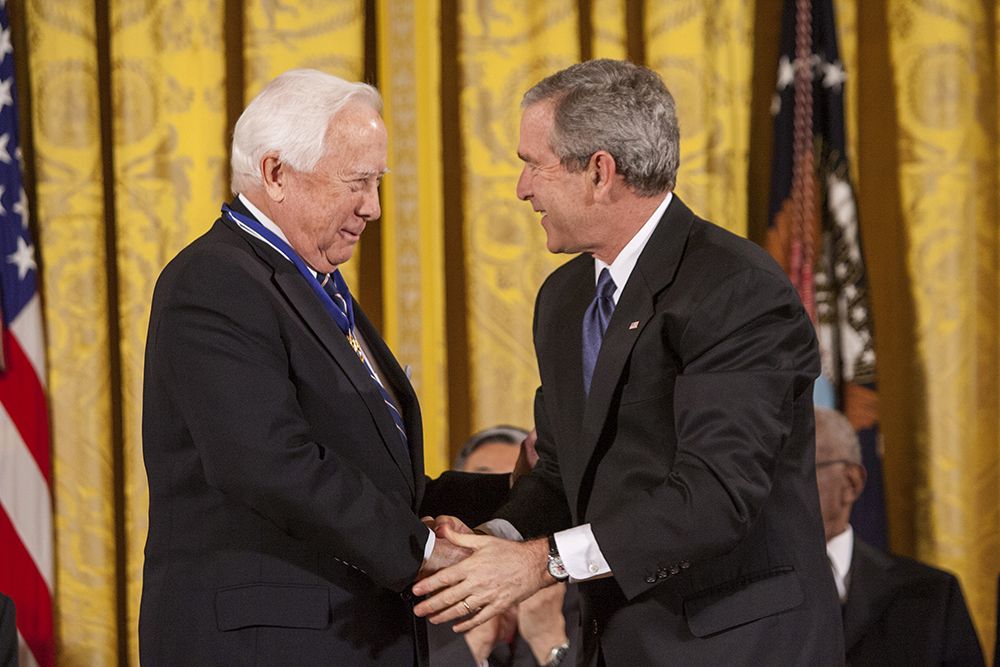On August 7, 2022, a story about the death of a storyteller was national news. David McCullough who had celebrated his eighty-ninth birthday a month before would no longer sit at his typewriter and engage us in the history of the United States. Books about Theodore Roosevelt, Harry S. Truman and John Adams written by Mr. McCullough stand quietly on the shelves of libraries throughout the world waiting for a visitor to be captivated into their life stories. For those who search beyond a date of an event hoping to uncover the lives of those who settled in the United States and those who chose to lead the nation in the birth of a democracy could reach onto the bookshelf. In their hands would be David’s stories about the “Pioneers” and the year “1776”. To learn that George Washington was not a Marvel hero but a person who had doubts and occasionally misguided judgement but yet still fought on, speaks to those farmers who arrived on the shores of a new world and were given a musket and a promise of land to create a new life.
David’s portrayal of American History was honored with multiple awards such as the Presidential Medal of Freedom, Pulitzer Prize (twice) and a National Book Award. He has been interviewed by "60 Minutes," "Charlie Rose" and other media that can be seen on YouTube. His lectures have been conducted in front of Presidents and at college campuses. And in the town of Hingham, Massachusetts, which was his last home, he addressed their Historical society. One common point throughout all his lectures was that he saw himself as a story teller. The classification as a historian limited him to facts and dates. He was looking for the substance of us all as if the outline of a painting existed and he brought the color some might say human drama.
However, there is one story that does not wait on a library shelf or has received an award. This story could have been told in the same historical period as McCullough’s. It would contain same and different characters and the struggles and battles they fought to gain our freedom. The drama would be as intense. The love for family would be as warm. If David McCullough had told the story of this storyteller, more color would have been added to our country’s history. This story is the personal history of David McCullough.
Here is one of stories of a McCullough ancestor, Private James Rankin, born in County Down in the year 1757. He is the 3rd great grandfather of David McCullough. David’s mother’s maiden name was Rankin.
A quote from Theodore Roosevelt about the Scots-Irish:
“A stern, virile, bold and hardy people who formed the kernel of that American stock who were the pioneers of our people in the march westwards.”
Another quote from the West Virginia Encyclopedia:
“As pioneers the Scotch-Irish were noted for their restless nature; their hardiness as hunters and settlers; their spirit of adventure; their strong Protestant faith (and yet their passion for drinking and gambling); their quirk temper; their contempt for nobility and titles; their ferocity toward the Indians. They came from an uprooted people; and they showed little mercy in uprooting others. The German pioneers were often better farmers, and their lands were usually superior. However, in time of war, or when quick action was demanded on the frontier, the Scottish Irish were unmatched. No other ethnic group would be as significant in shaping the culture of West Virginia.”
And from a voice that was born in Lurgun, County, Armagh, on Oct. 2, 1722, and sailed to the New World with William Penn. James Logan, 1ST chosen by council as the Mayor of Philadelphia and later Governor of Pennsylvania, had this to say: “Bold and indigent strangers, they were very rough on the Indians and intimates that the Quakers were afraid of the Ulsterites, thinking that they would soon gain control in Pennsylvania. They not only kept the Sabbath but kept everything else they got their hands on”.
James Logan was a Quaker and was married to Sarah Read, the 6th great aunt of David McCullough.
James Rankin, at the age of 3, with his two brothers William and John settled with their father Thomas (born in Derry and Thomas’s father in Scotland) in Augusta County, West Virginia at the foothills of the Allegheny Mountains. As more fertile land became available near Little Chartiers Creek. Thomas moved the family to where the crops could grow as would James. Even as of today, one of the roads leading to the lone gone farm is called “Thomas Road”.
On Jan. 21, 1777, 20-year old farmer James Rankin visited Wheeling, West Virginia and joined the Continental Army for a period of three years. One of the conditions that was written into his contract and the other members of the 13th was the promise that the regiment would remain in the west in case the Indians attacked their homes. However General Washington needed troops for his battles in New Jersey and the Continental Congress agreed to send the 13th. Before James Rankin and his fellow soldiers headed up to New Jersey, the Indian attacks in the west were escalating. The decision to move the 13th was delayed.
General Howe of the British army and his massive number of soldiers began their march towards the colony’s capital of Philadelphia. Before exiting Fort Pitt, James was paid for eight months of service at a rate of $6.75 a month. His friend Philip Finn, the drum and fifer for the 13th received $7.30 a month. This would be a constant item for discussion between the two men over the next three years.
The 13th Virginia regiment’s stay at Fort Pitt (soon to be Pittsburgh where David McCullough was born) was over. Equipment was packed up; rifles were heaved to shoulders as Chads Ford Creek awaited the 13th and Private James Rankin. The 13th would also have as its Lieutenant John Gibson, the son of an Antrim man, George Gibson, who exchanged goods with the Conestogas, who often met near his tavern in Lancaster, Pennsylvania.
Private James Rankin’s first pay in the military was from his enlistment date up to a few days before heading into the Battle of Brandywine on September 11, 1777. It was noted that the pay included all of September since he and the 13th would be very busy fighting the British Army. The form that stipulated the amount to be paid ($6.67 a month for 8 months and 2 days) also indicated that “Capt. Silas Zane’s Company in the 13th Virginia Regiment commanded by Col. William Russell” were in charge.
A letter written about the first battle for Private Rankin:
On the evening of September 11, 1777, General George Washington composed a letter to the Continental Congress.
“I am sorry to inform you that in this day’s engagement we have been obliged to leave the enemy masters of the field. Unfortunately the intelligence received of the enemy’s advancing up the Brandywine, and crossing at a Ford about six miles above us, was uncertain and contradictory, notwithstanding all my pains to get the best…Our loss of men is not, I am persuaded, very considerable; I believe much less than the enemy’s…Notwithstanding the misfortune of the day, I am happy to find the troops in good spirit; and I hope another time we shall compensate for the losses now sustained. The Marquis La Fayette was wounded in the leg, and General Woodford in the hand. Diver’s other officers were wounded, and some slain, but the numbers of each cannot now be ascertained.
I have the honor to be, Sir, your obedient humble servant.
G. Washington
P.S. It has not been in my power to send earlier intelligence; the present being the first leisure moment I have had since the action.”
To read the second and concluding part of the story, click here.








